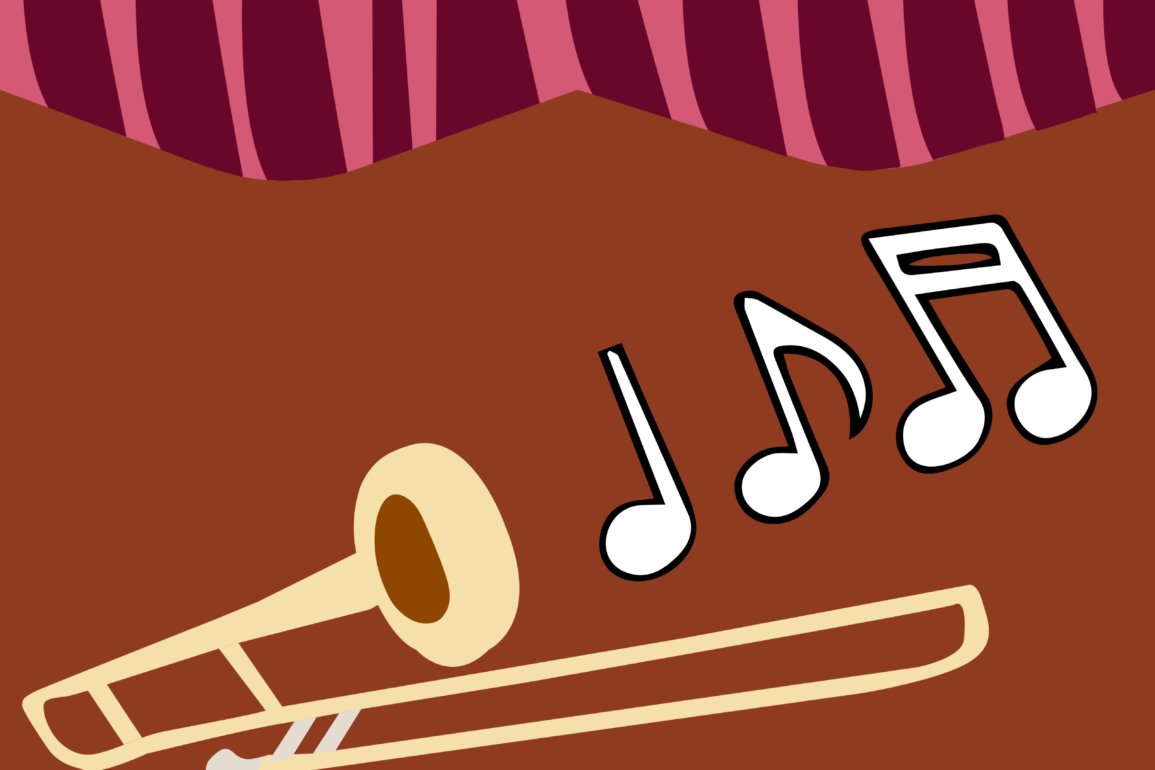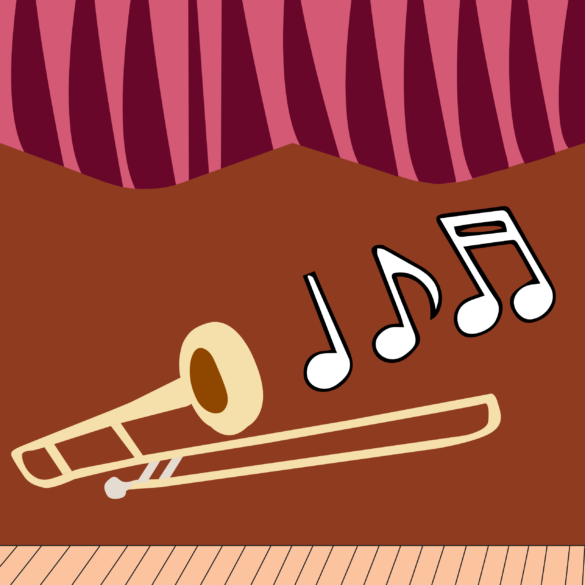Imagine a giant instrument dancing across the screen during a cartoon. Its colors, magical sounds, and animated facial expression is sure to interest a young child who believes the musical instrument has come alive. That’s exactly what happened to Ben Ward, a first-year student at Ball State University. Now, Ben is able to find spaces on Ball State’s campus to indulge the young child that was once interested in an animated tuba.
Music as an individual space
Ben, majoring in music education, found his inspiration to play music when he was younger.
“My mom was the only one in my family who had a musical background,” Ben says. “She was a flute player, and she told me she had a lot of fun doing it. I watched cartoons as a little kid, and I … [thought that] the tuba looks cool.”
When Ben was in elementary school, he had his first experience playing music.
“I played the recorder,” Ben says. “But we had called it the recorder karate, and I was a try-hard, and I became a black belt, and I thought I was the coolest.”
Recorder karate is where students learning recorder can achieve different “belts” by increasing their skill and passing music tests to get each belt.
After that experience, Ben felt proud of himself.
“I felt I accomplished something, and it was like I put a bunch of work in,” Ben says. “I have goals, and music is one of those things [where] you don’t see short term results.”
Ben had the opportunity to join the school band during his first year of middle school, and he played the trombone.
“I stuck with trombone because first off, it’s not super hard, but it also has a lot of the coolest music parts,” Ben says. “You can play really loud for fun, and no one’s going to be like it sounds terrible.”
Ben continued to stay involved with the band for all four years of high school. During high school, Ben became very familiar with the spaces surrounding him as he was playing music.
“I had rehearsal in the band rooms, but also I used [the] practice rooms a lot, like every day, like five days a week.”
In addition to being involved with his high school band, Ben took on additional music roles at his school.
“I also got to perform at gigs throughout the school,” Ben says. “In my senior year, I got to do welcoming music and little jam sets at a senior dinner party and for awards.”
As his junior year started, Ben found motivation to pursue music as a career through his new band director. His band director would stay with him after school and help keep him motivated toward music.
“Outside of the school, I’ve done a lot of camps. I’ve done the Indiana University summer music clinic in 2022,” Ben says. “I did a lot of community orchestra stuff, and then this summer, I marched drum corps at Pacific Crest, which was really cool.”
These camps helped Ben meet and connect with other people who played music.
“What I like about music is it’s kind of universal, you’ll meet someone you do not even know,” Ben says. “And I have it in jazz bands and stuff; you just click because you have a common interest.”
Although he has only been a student at Ball State since August, Ben has found several spaces where he can continue to stay involved with music outside of the classroom.
“I’ve really enjoyed the overall music facilities here at Ball State, especially Sursa Hall,” Ben says. “It’s really a beautiful performance hall.”
In addition to Sursa Hall, Ben enjoys playing at Hahn Recital Hall because of the practice rooms that are available to him there.
Along with his involvement in Jazz Two, Ben plays music with the people in his dorm since he lives in Schmidt-Wilson, the performing arts living learning community.
Ben has played in the practice rooms and met a few people, and they have “jam sessions” together.
“We just play jazz, like standards and stuff. We have a piano player, a drummer, and whoever else wants to hop in,” he says.
Music as a collective space
Jon Truitt, the director of opera and professor of music performance, and the School of Music associate director for academic affairs at Ball State, believes that music allows students to connect with each other.
“There’s a synergy between the performer and the singer, the communication channel, if you will,” Truitt says. “There’s a communal aspect of collaborating with other people.”
For children in elementary school, Truitt believes that music allows them to learn about and expand their experience with other cultures.
With people having various backgrounds with their music experience, there are several ways for people to become involved with music at Ball State.
“If you personally wanted to be in Cardinal Chorus, which is our Tenor/Bass ensemble, all you would have to do is register, and you’re in,” Truitt says. “It’s a chance for you to feel like being in a choir.”
By being involved in music, Truitt believes that there are some benefits that come with it for personal growth.
“What music teaches us … is self discipline [through] long term planning, detail orientation, and communication skills,” Truitt says. “Critical thinking teaches you how to receive criticism in a constructive way and how to give it in a constructive way.”
In the 1950s, Truitt said many average people went to symphonies. However, that has changed in the following decades as technology has continued to develop.
“We’ve become, sort of as a culture, sort of atomized, where everyone’s walking around wearing earbuds or looking at their phone,” Truitt says. “And they’re all very in that bubble of electronic space, and they’re not doing that personal interaction that music requires.”
Truitt believes that the opportunities for students to experience music culturally are there but that not enough people take advantage of them.
“At Ball State there’s so much free stuff that you can see in college,” Truitt says. “Just go see a concert and just go see a recital. Go do something that culturally, you’ll never get to do again … These things are really difficult to access other places, but here they’re right at your fingertips.”




